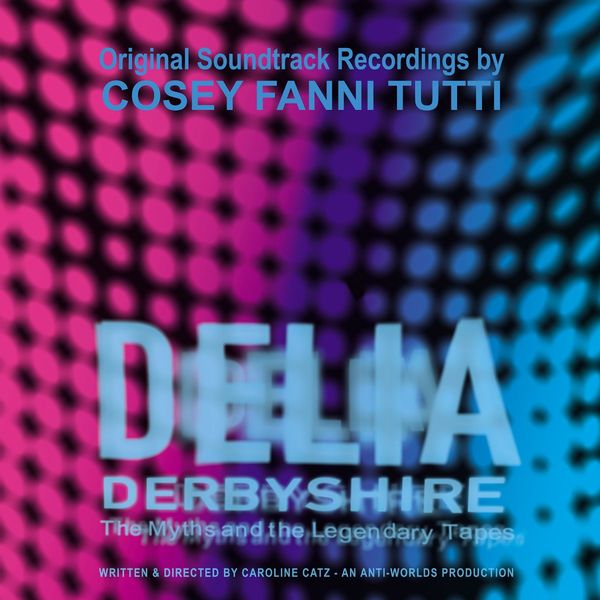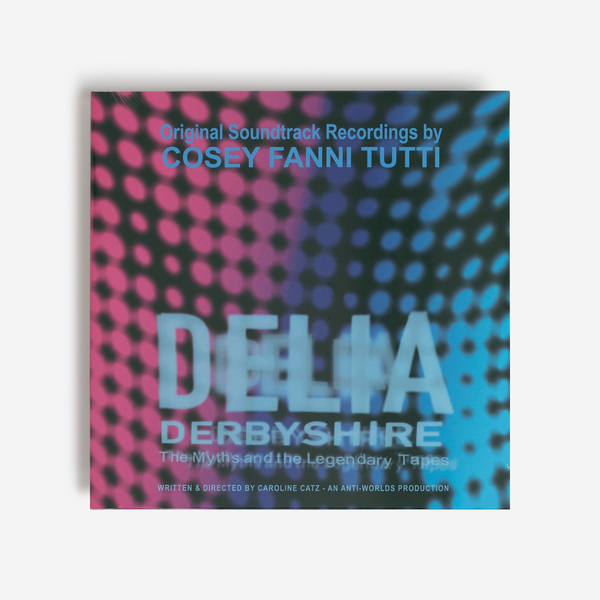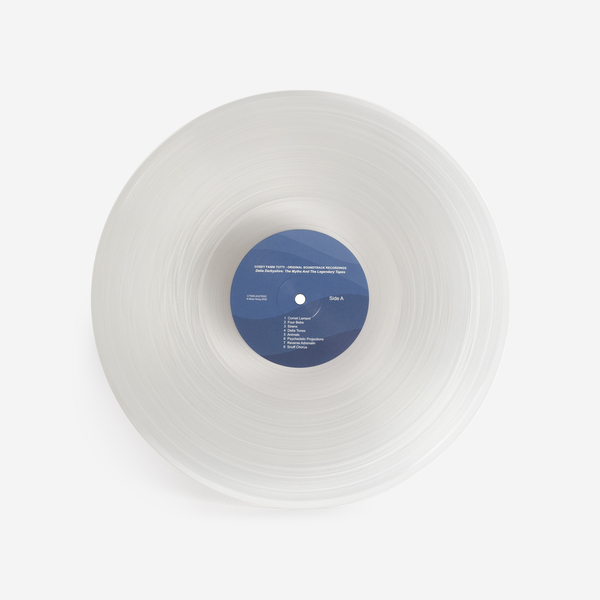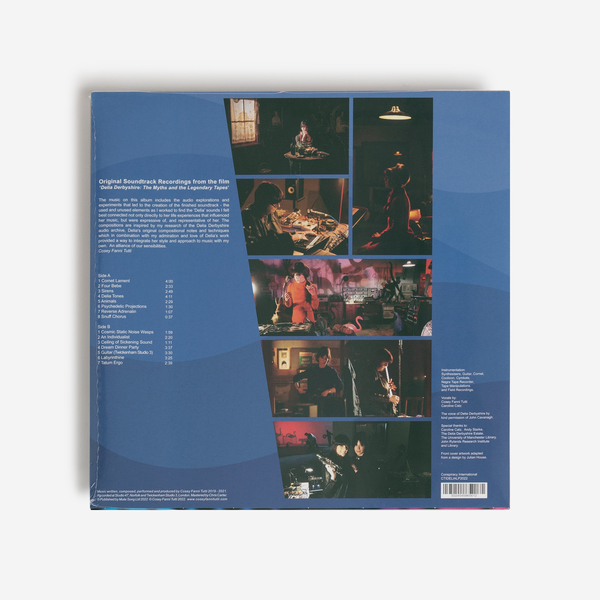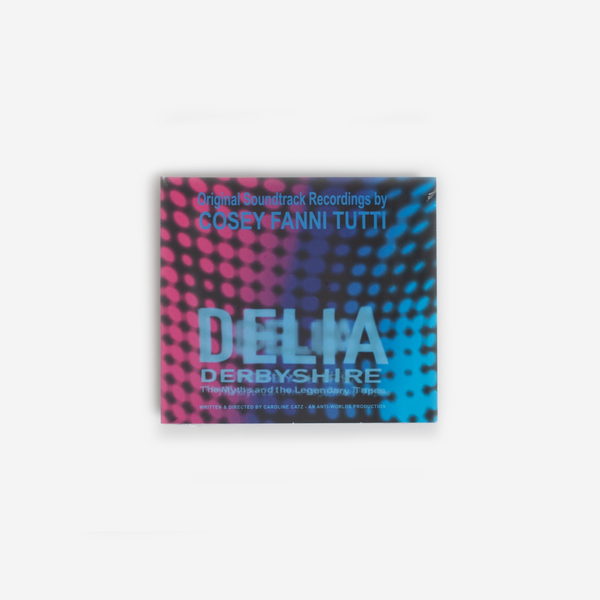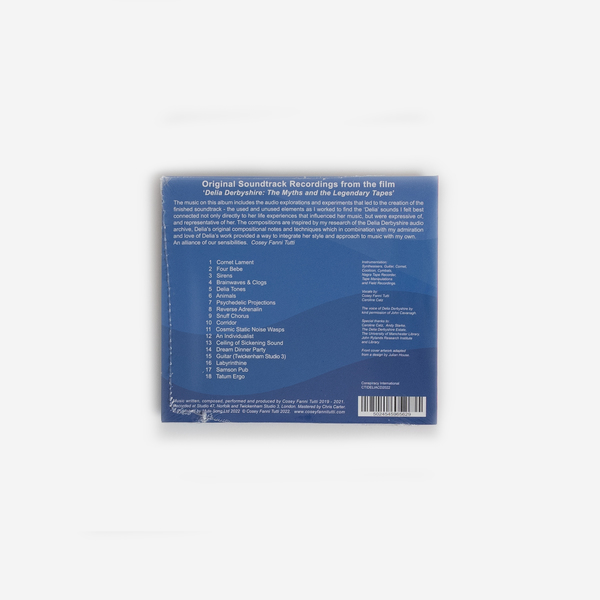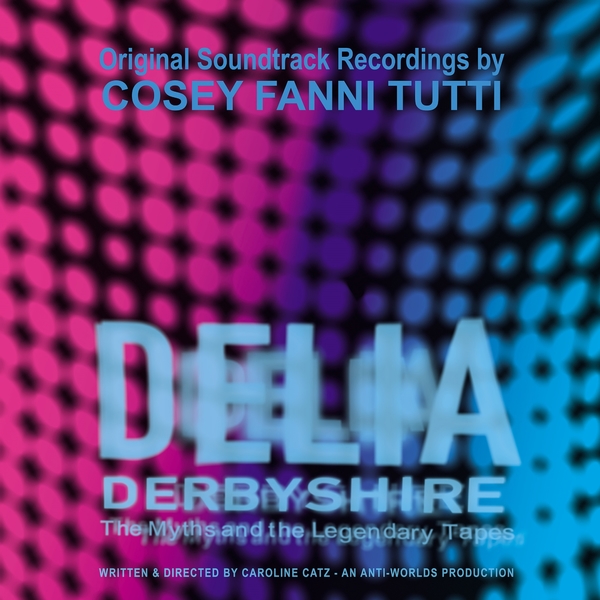Delia Derbyshire: The Myths and the Legendary Tapes (Original Soundtrack Recordings)
Cosey Fanni Tutti
Delia Derbyshire: The Myths and the Legendary Tapes (Original Soundtrack Recordings)
Boomkat Product Review:
Cosey Fanni Tutti's attempt to integrate Delia Derbyshire's style with her own is a dense, fascinating listen, using the Radiophonic Workshop composer's original notes for guidance on a full length suite of engrossing mood pieces.
Cosey finds a subtle meeting point between her slithering electronics and Derbyshire's future-facing oscillator and tape transmissions. Unlike her last album, 2019's "Tutti", there's none of the industrial percussion that reminded listeners how instrumental she was in shaping the sound of British electronic music. Those hypnotic synth textures that have always been central to Cosey's music sound even more poignant when colligated with Derbyshire's unmistakable sonic fingerprints.
The problem with finding enough music to accompany a full-length movie about Derbyshire is that the composer didn't record a great deal of original pieces. Those we have access to - the original "Doctor Who" theme and classics like 'Blue Veils and Golden Sands' and 'The Delian Mode' - are too well known to keep reusing again and again. So Tutti went to Derbyshire's notorious tape archive - a box of 267 reel-to-reel tapes and thousands of papers - entrusted to the Radiophonic Workshop's Mark Ayres after she died. Most interestingly, the archive also includes notes from Derbyshire about how she fabricated her sounds, allowing Tutti to visit similar sonic spaces using her own arsenal of synthesisers and tape machines.
From the opening track Cosey stamps her own signature, playing her beloved Cornet thru a dense fog of reverb, with percolating electronics doing their thing somewhere down below in the aether. Radiophonic markers extend throughout the album, through delay and reverb, then a creeping low-end that brings us into Derbyshire's world. Cosey rubs her industrial wares against Derbyshire's library rhythms on tracks like 'Four Bebe' and the squelchy 'Brainwaves & Clogs', and while there are throwback moments, for sure, by the end of the album you feel like you've witnessed a full collaboration between two peerless innovators. Cosey x Delia? Imagine that.
View more
Boomkat Product Review:
Cosey Fanni Tutti's attempt to integrate Delia Derbyshire's style with her own is a dense, fascinating listen, using the Radiophonic Workshop composer's original notes for guidance on a full length suite of engrossing mood pieces.
Cosey finds a subtle meeting point between her slithering electronics and Derbyshire's future-facing oscillator and tape transmissions. Unlike her last album, 2019's "Tutti", there's none of the industrial percussion that reminded listeners how instrumental she was in shaping the sound of British electronic music. Those hypnotic synth textures that have always been central to Cosey's music sound even more poignant when colligated with Derbyshire's unmistakable sonic fingerprints.
The problem with finding enough music to accompany a full-length movie about Derbyshire is that the composer didn't record a great deal of original pieces. Those we have access to - the original "Doctor Who" theme and classics like 'Blue Veils and Golden Sands' and 'The Delian Mode' - are too well known to keep reusing again and again. So Tutti went to Derbyshire's notorious tape archive - a box of 267 reel-to-reel tapes and thousands of papers - entrusted to the Radiophonic Workshop's Mark Ayres after she died. Most interestingly, the archive also includes notes from Derbyshire about how she fabricated her sounds, allowing Tutti to visit similar sonic spaces using her own arsenal of synthesisers and tape machines.
From the opening track Cosey stamps her own signature, playing her beloved Cornet thru a dense fog of reverb, with percolating electronics doing their thing somewhere down below in the aether. Radiophonic markers extend throughout the album, through delay and reverb, then a creeping low-end that brings us into Derbyshire's world. Cosey rubs her industrial wares against Derbyshire's library rhythms on tracks like 'Four Bebe' and the squelchy 'Brainwaves & Clogs', and while there are throwback moments, for sure, by the end of the album you feel like you've witnessed a full collaboration between two peerless innovators. Cosey x Delia? Imagine that.
Boomkat Product Review:
Cosey Fanni Tutti's attempt to integrate Delia Derbyshire's style with her own is a dense, fascinating listen, using the Radiophonic Workshop composer's original notes for guidance on a full length suite of engrossing mood pieces.
Cosey finds a subtle meeting point between her slithering electronics and Derbyshire's future-facing oscillator and tape transmissions. Unlike her last album, 2019's "Tutti", there's none of the industrial percussion that reminded listeners how instrumental she was in shaping the sound of British electronic music. Those hypnotic synth textures that have always been central to Cosey's music sound even more poignant when colligated with Derbyshire's unmistakable sonic fingerprints.
The problem with finding enough music to accompany a full-length movie about Derbyshire is that the composer didn't record a great deal of original pieces. Those we have access to - the original "Doctor Who" theme and classics like 'Blue Veils and Golden Sands' and 'The Delian Mode' - are too well known to keep reusing again and again. So Tutti went to Derbyshire's notorious tape archive - a box of 267 reel-to-reel tapes and thousands of papers - entrusted to the Radiophonic Workshop's Mark Ayres after she died. Most interestingly, the archive also includes notes from Derbyshire about how she fabricated her sounds, allowing Tutti to visit similar sonic spaces using her own arsenal of synthesisers and tape machines.
From the opening track Cosey stamps her own signature, playing her beloved Cornet thru a dense fog of reverb, with percolating electronics doing their thing somewhere down below in the aether. Radiophonic markers extend throughout the album, through delay and reverb, then a creeping low-end that brings us into Derbyshire's world. Cosey rubs her industrial wares against Derbyshire's library rhythms on tracks like 'Four Bebe' and the squelchy 'Brainwaves & Clogs', and while there are throwback moments, for sure, by the end of the album you feel like you've witnessed a full collaboration between two peerless innovators. Cosey x Delia? Imagine that.
Boomkat Product Review:
Cosey Fanni Tutti's attempt to integrate Delia Derbyshire's style with her own is a dense, fascinating listen, using the Radiophonic Workshop composer's original notes for guidance on a full length suite of engrossing mood pieces.
Cosey finds a subtle meeting point between her slithering electronics and Derbyshire's future-facing oscillator and tape transmissions. Unlike her last album, 2019's "Tutti", there's none of the industrial percussion that reminded listeners how instrumental she was in shaping the sound of British electronic music. Those hypnotic synth textures that have always been central to Cosey's music sound even more poignant when colligated with Derbyshire's unmistakable sonic fingerprints.
The problem with finding enough music to accompany a full-length movie about Derbyshire is that the composer didn't record a great deal of original pieces. Those we have access to - the original "Doctor Who" theme and classics like 'Blue Veils and Golden Sands' and 'The Delian Mode' - are too well known to keep reusing again and again. So Tutti went to Derbyshire's notorious tape archive - a box of 267 reel-to-reel tapes and thousands of papers - entrusted to the Radiophonic Workshop's Mark Ayres after she died. Most interestingly, the archive also includes notes from Derbyshire about how she fabricated her sounds, allowing Tutti to visit similar sonic spaces using her own arsenal of synthesisers and tape machines.
From the opening track Cosey stamps her own signature, playing her beloved Cornet thru a dense fog of reverb, with percolating electronics doing their thing somewhere down below in the aether. Radiophonic markers extend throughout the album, through delay and reverb, then a creeping low-end that brings us into Derbyshire's world. Cosey rubs her industrial wares against Derbyshire's library rhythms on tracks like 'Four Bebe' and the squelchy 'Brainwaves & Clogs', and while there are throwback moments, for sure, by the end of the album you feel like you've witnessed a full collaboration between two peerless innovators. Cosey x Delia? Imagine that.
Back in stock. Transparent coloured vinyl.
Available To Order (Estimated Shipping between 7-14 Working Days)
This item is to the best of our knowledge available to us from the supplier and should ship to you within the time-frame indicated. If there are any unforeseen issues with availability we will notify you immediately
Boomkat Product Review:
Cosey Fanni Tutti's attempt to integrate Delia Derbyshire's style with her own is a dense, fascinating listen, using the Radiophonic Workshop composer's original notes for guidance on a full length suite of engrossing mood pieces.
Cosey finds a subtle meeting point between her slithering electronics and Derbyshire's future-facing oscillator and tape transmissions. Unlike her last album, 2019's "Tutti", there's none of the industrial percussion that reminded listeners how instrumental she was in shaping the sound of British electronic music. Those hypnotic synth textures that have always been central to Cosey's music sound even more poignant when colligated with Derbyshire's unmistakable sonic fingerprints.
The problem with finding enough music to accompany a full-length movie about Derbyshire is that the composer didn't record a great deal of original pieces. Those we have access to - the original "Doctor Who" theme and classics like 'Blue Veils and Golden Sands' and 'The Delian Mode' - are too well known to keep reusing again and again. So Tutti went to Derbyshire's notorious tape archive - a box of 267 reel-to-reel tapes and thousands of papers - entrusted to the Radiophonic Workshop's Mark Ayres after she died. Most interestingly, the archive also includes notes from Derbyshire about how she fabricated her sounds, allowing Tutti to visit similar sonic spaces using her own arsenal of synthesisers and tape machines.
From the opening track Cosey stamps her own signature, playing her beloved Cornet thru a dense fog of reverb, with percolating electronics doing their thing somewhere down below in the aether. Radiophonic markers extend throughout the album, through delay and reverb, then a creeping low-end that brings us into Derbyshire's world. Cosey rubs her industrial wares against Derbyshire's library rhythms on tracks like 'Four Bebe' and the squelchy 'Brainwaves & Clogs', and while there are throwback moments, for sure, by the end of the album you feel like you've witnessed a full collaboration between two peerless innovators. Cosey x Delia? Imagine that.
Available To Order (Estimated Shipping between 7-14 Working Days)
This item is to the best of our knowledge available to us from the supplier and should ship to you within the time-frame indicated. If there are any unforeseen issues with availability we will notify you immediately
Boomkat Product Review:
Cosey Fanni Tutti's attempt to integrate Delia Derbyshire's style with her own is a dense, fascinating listen, using the Radiophonic Workshop composer's original notes for guidance on a full length suite of engrossing mood pieces.
Cosey finds a subtle meeting point between her slithering electronics and Derbyshire's future-facing oscillator and tape transmissions. Unlike her last album, 2019's "Tutti", there's none of the industrial percussion that reminded listeners how instrumental she was in shaping the sound of British electronic music. Those hypnotic synth textures that have always been central to Cosey's music sound even more poignant when colligated with Derbyshire's unmistakable sonic fingerprints.
The problem with finding enough music to accompany a full-length movie about Derbyshire is that the composer didn't record a great deal of original pieces. Those we have access to - the original "Doctor Who" theme and classics like 'Blue Veils and Golden Sands' and 'The Delian Mode' - are too well known to keep reusing again and again. So Tutti went to Derbyshire's notorious tape archive - a box of 267 reel-to-reel tapes and thousands of papers - entrusted to the Radiophonic Workshop's Mark Ayres after she died. Most interestingly, the archive also includes notes from Derbyshire about how she fabricated her sounds, allowing Tutti to visit similar sonic spaces using her own arsenal of synthesisers and tape machines.
From the opening track Cosey stamps her own signature, playing her beloved Cornet thru a dense fog of reverb, with percolating electronics doing their thing somewhere down below in the aether. Radiophonic markers extend throughout the album, through delay and reverb, then a creeping low-end that brings us into Derbyshire's world. Cosey rubs her industrial wares against Derbyshire's library rhythms on tracks like 'Four Bebe' and the squelchy 'Brainwaves & Clogs', and while there are throwback moments, for sure, by the end of the album you feel like you've witnessed a full collaboration between two peerless innovators. Cosey x Delia? Imagine that.
More from Cosey Fanni Tutti:
-
 Cosey Fanni Tutti TUTTI Conspiracy International Electronic
Cosey Fanni Tutti TUTTI Conspiracy International Electronic- MP3
- FLAC
- WAV
- Colour LP
- CD
-
 Cosey Fanni Tutti Time To Tell Conspiracy International Electronic
Cosey Fanni Tutti Time To Tell Conspiracy International Electronic- MP3
- FLAC
- WAV
- Colour LP
-
 Cosey Fanni Tutti Electronic Ambient Remixes Two Conspiracy International Electronic
Cosey Fanni Tutti Electronic Ambient Remixes Two Conspiracy International Electronic- MP3
- FLAC
- WAV
-
 Cosey Fanni Tutti Electronic Ambient Remixes Four: Selflessness Conspiracy International Dark Ambient / Drone / Metal
Cosey Fanni Tutti Electronic Ambient Remixes Four: Selflessness Conspiracy International Dark Ambient / Drone / Metal- CD
-
 Cosey Fanni Tutti Selflessness - Electronic Ambient Remixes Four Conspiracy International Electronic
Cosey Fanni Tutti Selflessness - Electronic Ambient Remixes Four Conspiracy International Electronic- MP3
- FLAC
- WAV
More from Conspiracy International:
-
 FREE MP3 WITH VINYLCHRIS & COSEY Techno Primitiv Conspiracy International Electronic
FREE MP3 WITH VINYLCHRIS & COSEY Techno Primitiv Conspiracy International Electronic- MP3
- FLAC
- WAV
- Colour LP
-
 FREE MP3 WITH VINYLCHRIS & COSEY Trust Conspiracy International Electronic
FREE MP3 WITH VINYLCHRIS & COSEY Trust Conspiracy International Electronic- MP3
- FLAC
- WAV
- Colour LP
-
 FREE MP3 WITH VINYLCHRIS & COSEY Pagan Tango Conspiracy International Electronic
FREE MP3 WITH VINYLCHRIS & COSEY Pagan Tango Conspiracy International Electronic- MP3
- FLAC
- WAV
- Colour LP
-
 FREE MP3 WITH VINYLCHRIS & COSEY Heartbeat Conspiracy International Industrial / Wave / Electro
FREE MP3 WITH VINYLCHRIS & COSEY Heartbeat Conspiracy International Industrial / Wave / Electro- MP3
- FLAC
- WAV
-
 FREE MP3 WITH VINYLCHRIS & COSEY Trance Conspiracy International Industrial / Wave / Electro
FREE MP3 WITH VINYLCHRIS & COSEY Trance Conspiracy International Industrial / Wave / Electro- MP3
- FLAC
- WAV
- Colour LP
People who bought this also bought:
-
 FREE MP3 WITH VINYLTHE FOCUS GROUP Hey Let Loose Your Love Ghost Box Electronic
FREE MP3 WITH VINYLTHE FOCUS GROUP Hey Let Loose Your Love Ghost Box Electronic- MP3
- FLAC
- 10" (Black Vinyl)
- CD
-
 FREE MP3 WITH VINYLTHE FUTURE SOUND OF LONDON Papua New Guinea JUMPIN' & PUMPIN' Electronic
FREE MP3 WITH VINYLTHE FUTURE SOUND OF LONDON Papua New Guinea JUMPIN' & PUMPIN' Electronic- MP3
- FLAC
- WAV
- 12" (Black Vinyl)
-
 FREE MP3 WITH VINYLThe Advisory Circle Ways of Seeing Ghost Box Electronic
FREE MP3 WITH VINYLThe Advisory Circle Ways of Seeing Ghost Box Electronic- MP3
- FLAC
- WAV
- CD
-
 The Utopia Strong The Utopia Strong Rocket Recordings Electronic
The Utopia Strong The Utopia Strong Rocket Recordings Electronic- MP3
- FLAC
- WAV
- Colour LP
- Colour LP
- CD
-
 FREE MP3 WITH VINYLRomance & Dean Hurley In Every Dream Home A Heartache Ecstatic Electronic
FREE MP3 WITH VINYLRomance & Dean Hurley In Every Dream Home A Heartache Ecstatic Electronic- MP3
- FLAC
- WAV
-
 FREE MP3 WITH VINYLEros A Southern Code Downwards Electronic
FREE MP3 WITH VINYLEros A Southern Code Downwards Electronic- MP3
- FLAC
- WAV
- LP (Black Vinyl)
-
 FREE MP3 WITH VINYLThe Advisory Circle Full Circle Ghost Box Electronic
FREE MP3 WITH VINYLThe Advisory Circle Full Circle Ghost Box Electronic- MP3
- FLAC
- WAV
- 2 X 10"
- CD
-
 FREE MP3 WITH VINYLTaylor E. Burch The Best of Taylor E. Burch Downwards Electronic
FREE MP3 WITH VINYLTaylor E. Burch The Best of Taylor E. Burch Downwards Electronic- MP3
- FLAC
- WAV
- Cassette
-
 FREE MP3 WITH VINYLKAKUHAN Metal Zone NAKID Electronic
FREE MP3 WITH VINYLKAKUHAN Metal Zone NAKID Electronic- MP3
- FLAC
- WAV
- Colour LP
-
 FREE MP3 WITH VINYLMalvern Brume Body Traffic MAL Electronic
FREE MP3 WITH VINYLMalvern Brume Body Traffic MAL Electronic- MP3
- FLAC
- WAV
- LP (Black Vinyl)
